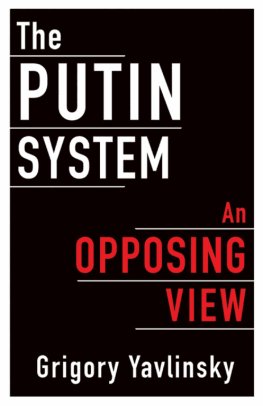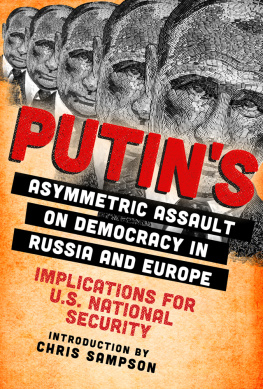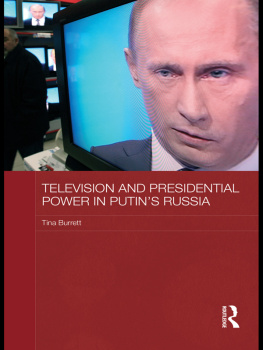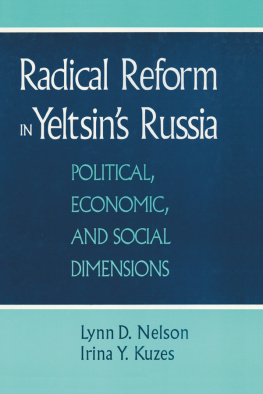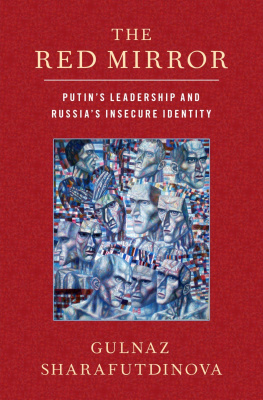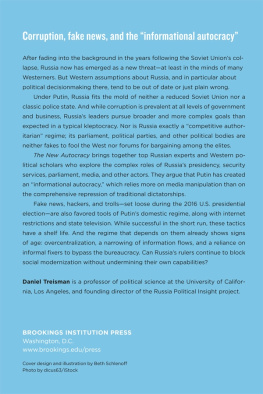Political Elites and the New Russia
Political Elites and the New Russia convincingly argues that although reforms in Russia have been initiated by those close to the President, in fact local and national elites have been the crucial strategic actors in reshaping Russias economy, democratising its political system and decentralising its administration.
This book analyses the political culture of elites under Yeltsin and Putin, discussing the extent to which they form coherent political orientations, and how far this culture has been in step with, or at odds with, the reform policies of the Kremlin leadership and consequences for state stability.
Anton Steen is Professor of Political Science at the University of Oslo. He has written on elites and democratisation in the Baltic States and is currently working on a project looking at elites and state-transformation in Russia.
BASEES/RoutledgeCurzon Series on Russian and East European Studies
Series editor
Richard Sakwa
Department of Politics and International Relations, University of Kent
Editorial committee
George Blazyca
Centre for Contemporary European Studies, University of Paisley
Terry Cox
Department of Government, University of Strathclyde
Rosalind Marsh
Department of European Studies and Modern Languages, University of Bath
David Moon
Department of History, University of Strathclyde
Hilary Pilkington
Centre for Russian and East European Studies, University of Birmingham
Stephen White
Department of Politics, University of Glasgow
This series is published on behalf of BASEES (the British Association for Slavonic and East European Studies). The series comprises original, highquality, research-level work by both new and established scholars on all aspects of Russian, Soviet, post-Soviet and East European Studies in humanities and social science subjects.
1 Ukraines Foreign and Security Policy, 19912000
Roman Wolczuk
2 Political Parties in the Russian Regions
Derek S. Hutcheson
3 Local Communities and Post-Communist Transformation
Edited by Simon Smith
4 Repression and Resistance in Communist Europe
J. C. Sharman
5 Political Elites and the New Russia
Anton Steen
6 Dostoevsky and the Idea of Russianness
Sarah Hudspith
First published 2003
by RoutledgeCurzon
11 New Fetter Lane, London EC4P 4EE
Simultaneously published in the USA and Canada
by RoutledgeCurzon
29 West 35th Street, New York, NY 10001
This edition published in the Taylor & Francis e-Library, 2004.
RoutledgeCurzon is an imprint of the Taylor & Francis Group
2003 Anton Steen
All rights reserved. No part of this book may be reprinted or reproduced or utilised in any form or by any electronic, mechanical, or other means, now known or hereafter invented, including photocopying and recording, or in any information storage or retrieval system, without permission in writing from the publishers.
British Library Cataloguing in Publication Data
A catalogue record for this book is available from the British Library
Library of Congress Cataloging in Publication Data
Steen, Anton, 1949
Political elites and the new Russia: the power basis of Yeltsins and Putins regimes / Anton Steen.
p. cm. (BASEES/RoutledgeCurzon series on Russian and East European studies; 5)
Simultaneously published in the USA and Canada.
Includes bibliographical references (p. ) and index.
1. Elite (Social sciences)Russia (Federation). 2. Political cultureRussia (Federation). 3. DemocracyRussia (Federation). 4. Post-communism Russia (Federation). 5. Russia (Federation)Politics and government1991.
I. Title. II. Series.
HN530.2.Z9E488 2003
305.520947dc21 2003041584
ISBN 0-203-18048-8 Master e-book ISBN
ISBN 0-203-34462-6 (Adobe eReader Format)
ISBN 0-415-30903-4 (Print Edition)
Preface
Seminal events, like major wars, the demise of empires and the fall of powerful regimes shape new historical epochs. The fall of communism represents such a change of epoch that not only affects those who were directly involved in the previous Soviet dominated area but have universal significance. We have now just started to envisage the consequences of restructuring the world political sphere from ideological confrontations to the politics of handling uncertainties in which weakened post-communist state power is seeking new forms of legitimacy. In this continuously more pluralised world the ruling elites need a political foundation that goes deeper than formal institutions and power instruments. Only internalised values among the broader leadership provide the basis for a minimum level of political integration and joint actions, and this is what this book is about. Using Russia as a case, the purpose is to analyse the emerging postcommunist political culture among the elites, and I will also discuss its causes, how it is forged by past legacies and new policy visions, and what consequences elite orientations have for the emerging Russian state.
During 198990 I became involved in a wave of events following the breakdown of the Soviet Union. My first interest and concern was the struggle for independence of the three Baltic states that had been occupied by the Soviet Union a generation before. The regained independence and the reorientation of these states towards democracy and market economy spurred a still ongoing project on Baltic elites. While these small states feel close, the most nearby resident is the Russian Federation with whom Norway shares a common border in the north. During the long period of the iron curtain this border was completely closed but has in the new epoch of post-communist Russia become a door for mutual exchange between our societies.
Although relations in the North are important for coping with common regional problems the main objective of this study is broader and hopefully provides a better understanding of what goes on among Russian national and regional elites more generally and what policy trajectories the elites may stimulate or obstruct. Obviously, their orientations and behaviour, their political culture, have consequences for NorwegianRussian relations and provides one justification for this book. However, the main reason is my fascination for how political culture relates to policy reforms. The reforms initiated by the top rulers and how they confronted the national and regional elites orientations I argue became decisive to the political, economic and federal compromises following the collapse of communism. The Kremlin leadership had to cope with unprecedented pluralised elites whose political culture and behaviour is crucial to an understanding of the viability and future of democratic, economic and federal reforms. The orientations and behaviour of Russian elites reflects not only the past but also the experiences and uncertainties arising from the shock-like reforms and weak formal state institutions of the last decade. This contradictory elite culture may be interpreted as an anomaly. However, as this study argues, the Russian elites link values of centralisation and decentralisation that made the new epoch possible and will have a major imprint on the coming decades not only on Russia but also on an increasingly interrelated political and economic world.


